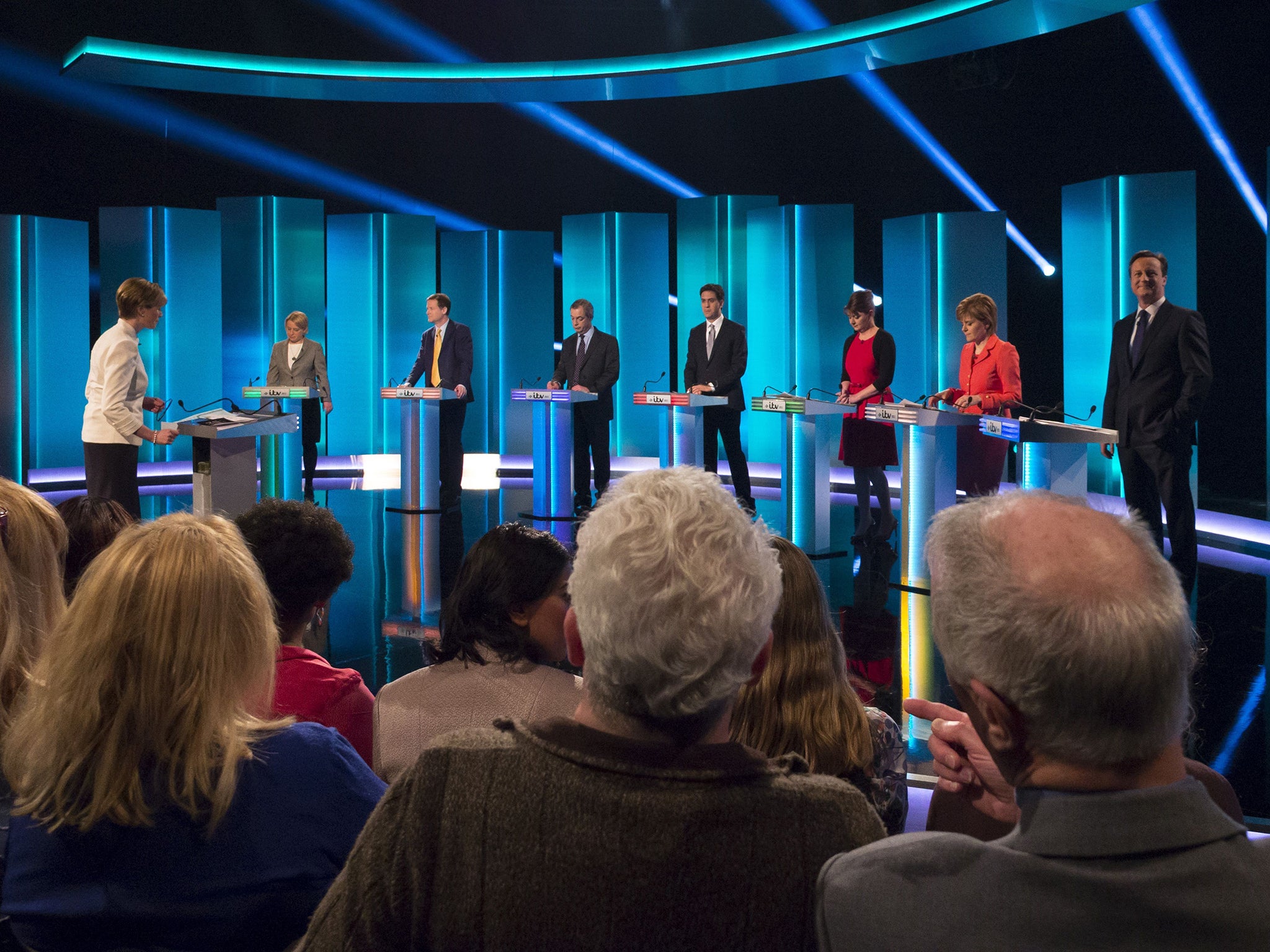Leaders' debates: Differing polls show no clear winner from seven-party clash
David Cameron, Ed Miliband, Nigel Farage and Nicola Sturgeon were broadly clustered near the top, while other three leaders lagged far behind

Your support helps us to tell the story
From reproductive rights to climate change to Big Tech, The Independent is on the ground when the story is developing. Whether it's investigating the financials of Elon Musk's pro-Trump PAC or producing our latest documentary, 'The A Word', which shines a light on the American women fighting for reproductive rights, we know how important it is to parse out the facts from the messaging.
At such a critical moment in US history, we need reporters on the ground. Your donation allows us to keep sending journalists to speak to both sides of the story.
The Independent is trusted by Americans across the entire political spectrum. And unlike many other quality news outlets, we choose not to lock Americans out of our reporting and analysis with paywalls. We believe quality journalism should be available to everyone, paid for by those who can afford it.
Your support makes all the difference.Anyone hoping for a clear winner to emerge from the seven-way leaders’ debate will be disappointed as polls show remarkably different results.
Surveys gauging the immediate reaction after last night’s performances presented a range of winners and several draws that made the picture of public opinion leading into the election look more confusing than ever.
An average of four surveys carried out by different companies put Labour’s Ed Miliband and Prime Minister David Cameron as joint winners on 22 per cent of the vote, one slim point ahead of Nigel Farage.
The Ukip leader was a close third on 21 per cent and the Scottish National Party’s Nicola Sturgeon was hot on his heels with 20 per cent.
The “Cleggmania” of 2010 looked long forgotten for the Deputy Prime Minister, who lagged behind at 9 per cent.
But Nick Clegg was at least a few points clear of Green Party leader Natalie Bennett and Leanne Wood from Plaid Cymru, languishing at 4 and 3 per cent respectively.
The individual polls presented a range of “winners”, with YouGov showing Ms Sturgeon clearly victorious on 28 per cent, despite the fact that her party is not fielding candidates in England, Wales or Northern Ireland.
Not one member of a YouGov panel held earlier this week could name the SNP leader, the Guardian reported, but by the end of the evening Google data showed that the sixth most searched question was: “Can I vote for the SNP?”
Survation tied Mr Cameron and Mr Miliband on 25 per cent and ICM put the Labour leader a shade ahead on 25 per cent to the Tory Prime Minister’s 24 per cent.
ComRes found a three-way tie between the Conservative, Labour and Ukip leaders – all on 21 per cent – with Ms Sturgeon just a point behind.
Andrew Hawkins, the chairman of ComRes, said the differing poll results could be explained by a number of factors, including how companies weighted the votes and the fact responses were taken within minutes of the debate finishing.
“With seven leaders it’s very different beast to the three-leader debate we had in 2010,” he told The Independent.
“Even though it was two hours long, they had so little time to land any body blows on each other or gain any sort of advantage, so it’s very difficult to make an impact.”
Mr Hawkins said that a ComRes poll half way through the debate showed Mr Farage clearly in the lead but that the Ukip leader seemed to slip with his comments about HIV treatment.
His claim that “60 per cent” of diagnoses were made for foreign nationals sparked an angry backlash on Twitter and a swift reprimand by Ms Wood, who told him he “should be ashamed”.
Commenting on the success of Ms Sturgeon and Mr Farage, Mr Hawkins cautioned that the television debate format innately favours smaller parties presenting themselves as an alternative to mainstream politics – a position occupied happily by Mr Clegg in 2010.
He added: “Policy and what they would do for the country is secondary to how they come across on television.”
As well as asking who people believed to be the overall winner of the debate, ComRes also questioned voters on how they felt about the leaders.
Mr Farage was voted to appear the “most honest”, Mr Miliband the “most understanding of your concerns” and Mr Cameron both the “most capable of leading the country” and “having the best ideas for Britain’s future”.
Survation found that the Labour leader was perceived to be the best on the NHS, Mr Farage on immigration and the Prime Minister on the country’s future and economy.
Similarly, YouGov found Mr Cameron ahead on the economy, the Ukip leader on immigration but Mr Miliband on health and education.
Last night’s leaders’ debate was one of several being held in the run-up to 7 May.
A question-and-answer programme featuring Mr Cameron and Mr Miliband separately was hosted by Channel 4 and Sky News last week, and a BBC debate involving opposition party leaders will be broadcast on 16 April.
There will also be a special Question Time a week before the general election, with the Conservative, Labour and Liberal Democrat leaders appearing one after the other to answer questions from a studio audience.
The Independent has got together with May2015.com to produce a poll of polls that produces the most up-to-date data in as close to real time as possible.
Click the buttons below to explore how the main parties' fortunes have changed:
All data, polls and graphics are courtesy of May2015.com. Click through for daily analysis, in-depth features and all the data you need. (All historical data used is provided by UK Polling Report)
Join our commenting forum
Join thought-provoking conversations, follow other Independent readers and see their replies
Comments